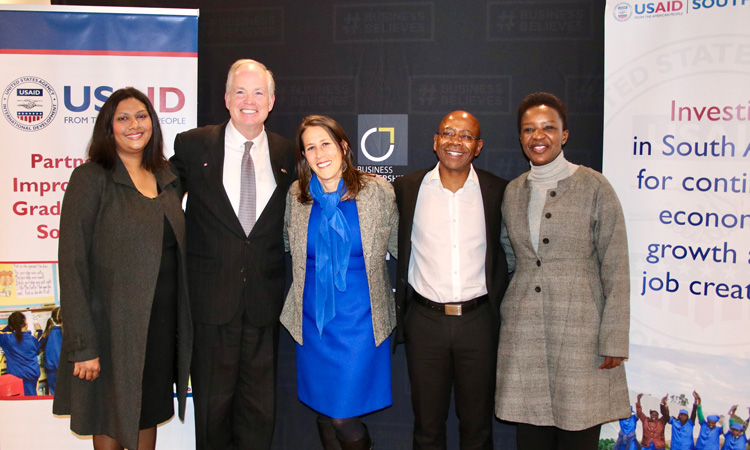Deputy Country Representative at the United States Agency for International Development (USAID)

The United States Agency for International Development (USAID) Nigeria, is seeking to employ a suitable and qualified candidate for the position below in the Program Office (PROG):
Job Title: Deputy Country Representative
Solicitation No: 72D0T119R00044
Location: Nigeria
Period of Performance: One year, with four one-year option periods
Security level Required: Secret
Start Date: Within 45 days of receiving notification that required security and medical clearances have been obtained.
Introduction
- The OTI Deputy Country Representative – Nigeria is a member of the Democracy, Conflict and Humanitarian Assistance (DCHA)/OTI Africa (AFR) Regional Team, reports to the OTI Country Representative or his/her designee, and is based in Nigeria. The Deputy Country Representative’s principal responsibility is to support the OTI Country Representative in the development, oversight, and management of the OTI country program.
- Nigeria is one of the U.S. Government’s most strategic allies in sub-Saharan Africa. Since the successful democratic transition of power in 2015, Nigeria still struggles with insecurity caused by Boko Haram and ISIS-West Africa (BH and ISIS-WA). An escalated military offensive by Nigerian and regional security forces helped the government reclaim areas previously held by BH and ISIS-WA, and provided an opportunity for communities to return to their homes. The insurgency is far from over, however, as BH and ISIS-WA have increased attacks in Nigeria and neighboring countries in the Lake Chad Basin. To defeat BH and ISIS-WA, military operations must be coupled with efforts to address the underlying drivers of violent extremism.
- OTI’s Northeast Nigeria program seeks to further U.S. foreign policy objectives in Nigeria through support that denies BH/ISIS-WA the space to operate by reducing recruitment and support for their ideology. OTI intends to address these critical issues through a flexible, small-grants mechanism which tailors approaches to the varied needs of communities in northeast Nigeria. The program may utilize both “soft” (e.g., cultural and recreational activities, media and strategic communications) and “hard” (e.g., small-scale infrastructure) activities to better connect communities, local actors, and the Nigerian government and to increase youth resistance to violent extremism. The program may also support national level activities, or other emerging transition needs.
- Due to the sensitive, fragile, and challenging environments in which OTI works, the office’s approach to programming is one that seeks to find creative, entrepreneurial, and unique ways to approach problem sets. These dynamic contexts require that programs adapt to rapidly evolving situations and that teams continually explore assumptions and test innovative tools and methods to achieve program objectives. Given OTI’s short-term political mission, its unpredictable working environments and the diffuse problems it seeks to address, OTI has developed ways to get smart quickly and act fast. OTI has honed a program approach that uses iterative strategic planning, where staff constantly review the current political situation, create relationships with communities and key actors, and undertake activities that will test what works and what doesn’t in order to inform future activities and priorities. Core qualities of a successful OTI program are characterized by a team that is able to be: fast, flexible, iterative, adaptive, and entrepreneurial.
Duties and Responsibilities
- Represent OTI interests during meetings with USAID Mission personnel, U.S. Embassy staff, host-country government officials, international organizations, indigenous andinternational non-governmental organizations (NGOs), and international donors interested in DCHA/OTI activities;
- Provide guidance on the identification and development of projects that meet OTI funding criteria, further OTI programmatic objectives, and complement other projects and programs implemented by other OTI offices, U.S. government agencies and donor organizations;
- Provide support for the design and execution of programs that follow OTI’s quick impact programming model in embassies or USAID Missions. Support to embassies and USAID Missions may include attendance and/or facilitation of program management processes for follow-on programming, including rolling assessments, strategy review sessions, program performance reviews and management reviews;
- Review proposals and grant concepts and work with diverse groups, many of which have not previously had international funding;
- Collaborate with the Country Representative in monitoring the performance of OTI implementing partners in the implementation of OTI-financed activities designed to achieve OTI strategic objectives;
- Travel to monitor and assess political conditions, implementing partner operational platforms, meet with potential grantees, host-country government and other program counterparts, and develop activity ideas;
- Mentor and train other OTI and implementing partner field staff;
- Take the lead on collecting information and drafting/editing regular reporting products;
- Assume higher representational responsibilities, potentially serving as Acting OTI Country Representative in his/her absence needed;
- Perform a wide range of administrative functions including budget preparation, financial management, records management, and travel assistance to help ensure programmatic success;
- Coordinate with the OTI Country Representative to develop an exit strategy that ensures reasonable time to transition from OTI programs to follow-on USAID or other donor programs;
- Communicate regularly and share program information with other USAID project managers, the US Embassy, bilateral donors, UN Organizations, International Organizations, and indigenous and international NGOs to ensure visibility and synergy of USAID/OTI activities;
- Support the Country Representative to ensure the use of OTI systems and procedures to maintain effective and efficient management of funds, programming, and monitoring and evaluation;
- Report to the OTI Country Representative and OTI/Washington on the status of: 1) grant development and implementation, 2) OTI contractor performance, 3) Foreign Service National (FSN) staff support needs and morale, 4) communication and coordination issues among OTI offices with other U.S. Government entities, 5) security concerns, 6) relations with local partners including local, state and national government representatives, and 7) other pertinent information required to achieve OTI’s program objectives;
- Manage and/or supervise the FSN staff, including program officers, administrative assistants and drivers alongside of the Country Representative;
- Supervise staff as delegated by the Country Representative (e.g. Program Managers, Program Assistants, Program Administrative Assistants, etc.). Provide orientation, training and mentoring for USAID staff supervised; assign work, explain how duties are to be performed to meet expectations, and communicate how the successful performance of those duties will be measured; evaluate staff performance; recognize good performance; communicate where performance needs to be improved; resolve complaints; and approve leave requests and timesheets as well as training, travel and program and operations requests.
Supervisory Relationship:
- The Deputy Country Representative will be supervised by the OTI Country Representative or his/her designee in the country of assignment.
- The incumbent is expected to take initiative, act independently, and manage his/her tasks with minimal supervision.
- Though this is a senior field-based position, the incumbent is expected to actively and proactively collaborate with OTI/Washington leadership, and to fully utilize, embrace, and become an expert on OTI systems and processes.
- Failure to adequately perform the scope of work above and/or failure to take direction from the supervisor may result in corrective actions, including denial of step or grade increases, extension of contract probationary periods, performance improvement plans, and/or termination for the convenience of USAID/OTI.
Supervisory Controls:
- The supervisor will set overall objectives and resources available, and work with the employee to develop deadlines, projects, and work to be accomplished.
- The employee will be responsible for planning and carrying out assignments, resolving most conflicts, coordinating with others, and interpreting policy in terms of established objectives.
- Keeping the supervisor informed of progress, the employee may determine the approach to be taken and the methodology to be used.
- The supervisor will review completed work from an overall standpoint of feasibility, compatibility with other work, or effectiveness in meeting requirements.
Physical Demands:
- While in Nigeria, the work is generally sedentary and does not pose undue physical demands. However, the position also requires travel throughout the country of assignment, which may involve some additional physical exertion including long periods of standing, walking over rough terrain, or carrying of moderately heavy items (less than 50 pounds).
Work Environment:
- While in Nigeria, the work is primarily performed in an office setting. However, the position also requires travel throughout the country of assignment, which may additionally involve special safety and/or security precautions, wearing of protective equipment, and exposure to severe weather conditions.
Minimum Qualifications Required for this Position
At a minimum, the applicant must have:
- A Master’s Degree with five (5) years of work experience; or a Bachelor’s Degree with seven (7) years of work experience;
- And a minimum of five (5) years of project management experience with a U.S. Government foreign affairs agency, international assistance organization, or non-governmental organization, in community development, economic development, mediation/arbitration, conflict resolution, democracy and governance, international law, human rights activities, and/or political analysis;
- One (1) year of overseas field experience working in a developing country;
- One (1) year of supervisory experience.
Benefit/Allowances
As a matter of policy, and as appropriate, a PSC is normally authorized the following benefits and allowances:
Benefits:
- Employer’s FICA Contribution
- Contribution toward Health & Life Insurance
- Pay Comparability Adjustment
- Annual Increase (pending a satisfactory performance evaluation)
- Eligibility for Worker’s Compensation
- Annual & Sick Leave.
Allowances (as applicable):
- Post Differential
- Living Quarters Allowance
- Temporary Lodging Allowance
- Post Allowance
- Supplemental Post Allowance
- Payments During Evacuation
- Education Allowance
- Separate Maintenance Allowance
- Danger Pay Allowance
- Education Travel.
Chapter 500 and Tables in Chapter 900.:
- Section 130.
- Section 120.
- Section 220.
- Section 230.
- Section 600.
- Section 270.
- Section 260.
- Section 650.
- Section 280.
Market Value
- This position has been designated at the GS-13 equivalent level, non-locality pay ($76,687- $99,691 per annum).
- Final compensation will be negotiated within the GS-13 equivalent level based upon the selected candidate’s salary history, qualifications, previous relevant experience and work history, and educational background as reported on AID-309-2.
- For selected candidates whose salary has been established on a Federal pay scale (i.e. General Schedule) or its equivalent, the base salary (not including locality pay) of their grade/step will be the basis of the salary.negotiation.
- Salaries over and above the pay range will not be entertained or negotiated.
Application Closing Date
23rd September, 2019.
The post Deputy Country Representative at the United States Agency for International Development (USAID) appeared first on Jobs in Nigeria – http://jobsinnigeria.careers.






